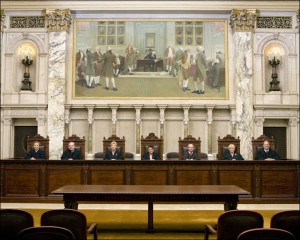Justices raise plea agreement possibility for attorney discipline
By: Eric Heisig//November 13, 2013//
Justices raise plea agreement possibility for attorney discipline
By: Eric Heisig//November 13, 2013//
 Eager to find ways to improve the state’s process of disciplining attorneys, Wisconsin justices recently discussed the possibility of allowing plea agreements in Office of Lawyer Regulation proceedings.
Eager to find ways to improve the state’s process of disciplining attorneys, Wisconsin justices recently discussed the possibility of allowing plea agreements in Office of Lawyer Regulation proceedings.
The notion arose at the state Supreme Court’s open rules conference Oct. 25, during which justices expressed concern about the length of time it takes to investigate and prosecute attorneys in state. Allowing attorneys who are under OLR investigation to reach plea agreements could move certain cases along faster, the justices said.
The OLR has been criticized over its investigations and cases that can often take more than a year to complete. OLR Director Keith Sellen and others have said shortening the length of investigations is something that needs to be considered.
There currently is no legal mechanism for reaching a plea agreement in OLR proceedings. Referees can dismiss charges on their merits, and Sellen said OLR prosecutors also can move to dismiss if the charges no longer can be proven.
“A lot of [these cases] could be disposed of more efficiently,” James Mohr, a Hartford attorney and state Supreme Court referee, said. “Intelligent attorneys should be able to work out an agreement … and save everybody time and money.”
Dean Dietrich, an attorney with Ruder Ware LLSC in Wausau and a member of the State Bar’s Committee on Professional Ethics, said many cases easily could be resolved if there was a mechanism to negotiate a plea. Attorneys facing discipline now have to accept the charges as laid forth or choose to fight back.
“The ability to negotiate,” Dietrich said, “especially in cases where no clients are harmed, makes the most sense in the world.”
Sellen said the justices have not asked him to draft a rule petition calling for plea agreements. If such a move were formally considered, he said, the agreements, as in criminal cases, would have to account for a victim’s wishes.
There still would be ways, he said, to ensure that attorneys would be held responsible for any wrongdoing they committed before or after the situation at the heart of the plea agreement.
“If something else happened, if it was before or after, it would not typically be covered by an agreement,” Sellen said. “We could easily define the scope of an agreement.”
Dietrich agreed, adding that a plea agreement option would be beneficial for cases where the facts surrounding a misconduct allegation are not straightforward.
“I’m not saying there should be an opportunity to plea bargain or negotiate to avoid a situation where they violated the rules,” Dietrich saidd. “I’m talking about the opportunity to plea bargain … when there is questions regarding whether or not there actually was a violation.”
Justices also expressed interest in researching the potential for plea agreements as part of a large-scale study of the attorney discipline system. Though a four-person study of the OLR was completed in 2011, recommendations from which still are under consideration, Chief Justice Shirley Abrahamson said a large-scale look at the system hasn’t been done in more than a decade.
Justice David Prosser said he would like to see a review done by a larger variety of people than the 2011 study.
“You need some people who are affected by the system and might have a different point of view,” he said in an interview. “Some people with a completely open mind on how the system ought to operate.”
Legal News
- State Bar leaders remain deeply divided over special purpose trust
- Former Wisconsin college chancellor fired over porn career is fighting to keep his faculty post
- Pecker says he pledged to be Trump campaign’s ‘eyes and ears’ during 2016 race
- A conservative quest to limit diversity programs gains momentum in states
- Wisconsin prison inmate pleads not guilty to killing cellmate
- Waukesha man sentenced to 30 years for Sex Trafficking
- 12-year-old shot in Milwaukee Wednesday with ‘serious injuries’
- Milwaukee man convicted of laundering proceeds of business email compromise fraud schemes
- Giuliani, Meadows among 18 indicted in Arizona fake electors case
- Some State Bar diversity participants walk away from program
- Wisconsin court issues arrest warrant ‘in error’ for Minocqua Brewing owner
- Iranian nationals charged cyber campaign targeting U.S. Companies
WLJ People
- Power 30 Personal Injury Attorneys – Russell Nicolet
- Power 30 Personal Injury Attorneys – Benjamin Nicolet
- Power 30 Personal Injury Attorneys – Dustin T. Woehl
- Power 30 Personal Injury Attorneys – Katherine Metzger
- Power 30 Personal Injury Attorneys – Joseph Ryan
- Power 30 Personal Injury Attorneys – James M. Ryan
- Power 30 Personal Injury Attorneys – Dana Wachs
- Power 30 Personal Injury Attorneys – Mark L. Thomsen
- Power 30 Personal Injury Attorneys – Matthew Lein
- Power 30 Personal Injury Attorneys – Jeffrey A. Pitman
- Power 30 Personal Injury Attorneys – William Pemberton
- Power 30 Personal Injury Attorneys – Howard S. Sicula











